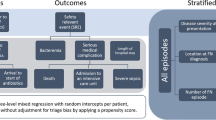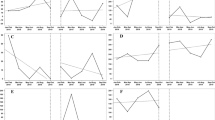Abstract
Purpose
The aim of this study was to determine the relationship between the time to antibiotic administration and patients’ outcomes of febrile neutropenia (FN). We also investigated the relationship between the time to antibiotics and mortality rates in a subgroup of patients with bacteremia or severe sepsis or septic shock.
Methods
From the Neutropenic Fever Registry, we analyzed 1001 consecutive FN episodes diagnosed from November 1, 2011, to August 31, 2014. Timing cutoffs for antibiotics included the following: ≤1 vs. >1 h, ≤2 vs. >2 h, ≤3 vs. >3 h, and ≤4 vs. >4 h. Multivariate logistic regression was used to adjust for potential confounders in the association between timing intervals and outcomes of FN episodes.
Results
The median length of time from triage to antibiotics was 140 min (interquartile range, 110–180 min). At each time cutoff, the time from triage to antibiotic administration was not significantly associated with FN outcomes after adjusting for potential confounders. Antibiotic timing was not significantly associated with complication rates in overall FN episodes. We failed to find a significant relationship between antibiotic timing and mortality in FN episodes with severe sepsis or septic shock or with bacteremia. Procalcitonin concentration and the Multinational Association for Supportive Care in Cancer (MASCC) risk index score were found to be more crucial determinants of outcomes in patients with FN.
Conclusions
The time to antibiotic administration is not a major factor in FN outcomes.



Similar content being viewed by others
References
Freifeld AG, Bow EJ, Sepkowitz KA, Boeckh MJ, Ito JI, Mullen CA, Raad II, Rolston KV, Young JA, Wingard JR, Infectious Diseases Society of A (2011) Clinical practice guideline for the use of antimicrobial agents in neutropenic patients with cancer: 2010 update by the infectious diseases society of America. Clin Infect Dis 52(4):e56–93
de Naurois J, Novitzky-Basso I, Gill MJ, Marti FM, Cullen MH, Roila F, Group EGW (2010) Management of febrile neutropenia: ESMO clinical practice guidelines. Ann Oncol 21(Suppl 5):v252–256
Tam CS, O'Reilly M, Andresen D, Lingaratnam S, Kelly A, Burbury K, Turnidge J, Slavin MA, Worth LJ, Dawson L, Thursky KA (2011) Use of empiric antimicrobial therapy in neutropenic fever. Australian consensus guidelines 2011 steering committee. Intern Med J 41(1b):90–101
Zuckermann J, Moreira LB, Stoll P, Moreira LM, Kuchenbecker RS, Polanczyk CA (2008) Compliance with a critical pathway for the management of febrile neutropenia and impact on clinical outcomes. Ann Hematol 87(2):139–145
Lynn JJ, Chen KF, Weng YM, Chiu TF (2013) Risk factors associated with complications in patients with chemotherapy-induced febrile neutropenia in emergency department. Hematol Oncol 31(4):189–196
Gaieski DF, Mikkelsen ME, Band RA, Pines JM, Massone R, Furia FF, Shofer FS, Goyal M (2010) Impact of time to antibiotics on survival in patients with severe sepsis or septic shock in whom early goal-directed therapy was initiated in the emergency department. Crit Care Med 38(4):1045–1053
Gross PA (2006) Hypotension and mortality in septic shock: the “golden hour. Crit Care Med 34(6):1819–1820
Dellinger RP, Levy MM, Carlet JM, Bion J, Parker MM, Jaeschke R, Reinhart K, Angus DC, Brun-Buisson C, Beale R, Calandra T, Dhainaut JF, Gerlach H, Harvey M, Marini JJ, Marshall J, Ranieri M, Ramsay G, Sevransky J, Thompson BT, Townsend S, Vender JS, Zimmerman JL, Vincent JL (2008) Surviving sepsis campaign: international guidelines for management of severe sepsis and septic shock: 2008. Crit Care Med 36(1):296–327
Rivers E, Nguyen B, Havstad S, Ressler J, Muzzin A, Knoblich B, Peterson E, Tomlanovich M, Early Goal-Directed Therapy Collaborative G (2001) Early goal-directed therapy in the treatment of severe sepsis and septic shock. N Engl J Med 345(19):1368–1377
Innes H, Lim SL, Hall A, Chan SY, Bhalla N, Marshall E (2008) Management of febrile neutropenia in solid tumours and lymphomas using the multinational association for supportive care in cancer (MASCC) risk index: feasibility and safety in routine clinical practice. Support Care Cancer 16(5):485–491
Lee DG, Kim SH, Kim SY, Kim CJ, Park WB, Song YG, Choi JH (2011) Evidence-based guidelines for empirical therapy of neutropenic fever in Korea. Korean J Intern Med 26(2):220–252
Klastersky J, Paesmans M, Rubenstein EB, Boyer M, Elting L, Feld R, Gallagher J, Herrstedt J, Rapoport B, Rolston K, Talcott J (2000) The multinational association for supportive care in cancer risk index: a multinational scoring system for identifying low-risk febrile neutropenic cancer patients. J Clin Oncol 18(16):3038–3051
Ahn S, Lee YS, Chun YH, Kwon IH, Kim W, Lim KS, Kim TW, Lee KH (2011) Predictive factors of poor prognosis in cancer patients with chemotherapy-induced febrile neutropenia. Support Care Cancer 19(8):1151–1158
Ahn S, Lee YS, Lim KS, Lee JL (2013) Adding procalcitonin to the MASCC risk-index score could improve risk stratification of patients with febrile neutropenia. Support Care Cancer 21(8):2303–2308
Ahn S, Lee YS (2012) Predictive factors for poor prognosis febrile neutropenia. Curr Opin Oncol 24(4):376–380
Szwajcer D, Czaykowski P, Turner D (2011) Assessment and management of febrile neutropenia in emergency departments within a regional health authority—a benchmark analysis. Curr Oncol 18(6):280–284
Perron T, Emara M, Ahmed S (2014) Time to antibiotics and outcomes in cancer patients with febrile neutropenia. BMC Health Serv Res 14:162
Houck PM, Bratzler DW, Nsa W, Ma A, Bartlett JG (2004) Timing of antibiotic administration and outcomes for medicare patients hospitalized with community-acquired pneumonia. Arch Intern Med 164(6):637–644
Garnacho J, Sole-Violan J, Sa-Borges M, Diaz E, Rello J (2003) Clinical impact of pneumonia caused by Acinetobacter baumannii in intubated patients: a matched cohort study. Crit Care Med 31(10):2478–2482
Meehan TP, Fine MJ, Krumholz HM, Scinto JD, Galusha DH, Mockalis JT, Weber GF, Petrillo MK, Houck PM, Fine JM (1997) Quality of care, process, and outcomes in elderly patients with pneumonia. JAMA 278(23):2080–2084
Kumar A, Roberts D, Wood KE, Light B, Parrillo JE, Sharma S, Suppes R, Feinstein D, Zanotti S, Taiberg L, Gurka D, Kumar A, Cheang M (2006) Duration of hypotension before initiation of effective antimicrobial therapy is the critical determinant of survival in human septic shock. Crit Care Med 34(6):1589–1596
Valles J, Rello J, Ochagavia A, Garnacho J, Alcala MA (2003) Community-acquired bloodstream infection in critically ill adult patients: impact of shock and inappropriate antibiotic therapy on survival. Chest 123(5):1615–1624
Conflict of interest
The authors declare that they have no conflicts of interest. We have full control of all primary data and agree to allow the journal to review the data if requested.
Author information
Authors and Affiliations
Corresponding author
Rights and permissions
About this article
Cite this article
Ko, B.S., Ahn, S., Lee, YS. et al. Impact of time to antibiotics on outcomes of chemotherapy-induced febrile neutropenia. Support Care Cancer 23, 2799–2804 (2015). https://doi.org/10.1007/s00520-015-2645-5
Received:
Accepted:
Published:
Issue Date:
DOI: https://doi.org/10.1007/s00520-015-2645-5




